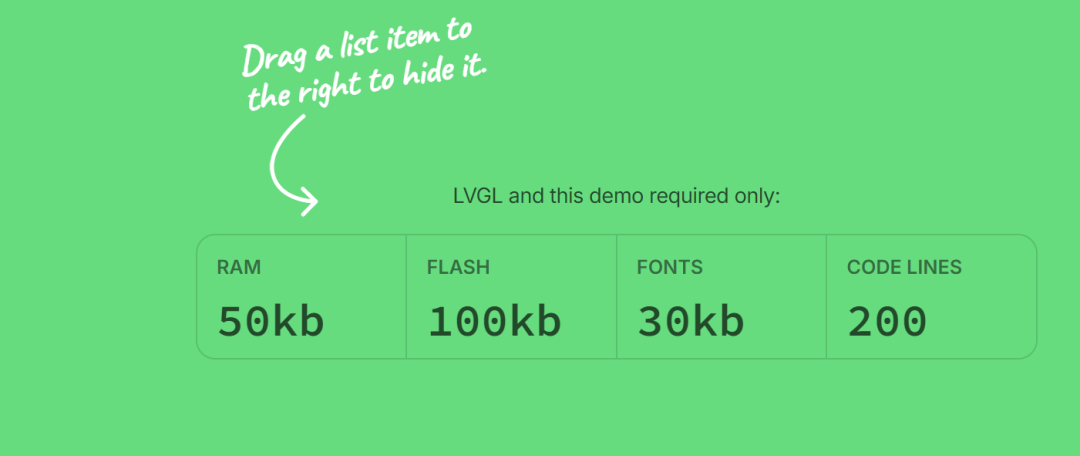
8-bit MCU Can Run RTOS
RTOS Supports Trimming
-
FreeRTOS’s FreeRTOSConfig.h file -
ucos’s os_cfg.h file -
……
#ifndef OS_CFG_H#define OS_CFG_H
/* --------------------------- MISCELLANEOUS --------------------------- */#define OS_CFG_APP_HOOKS_EN 1u /* Enable (1) or Disable (0) application specific hooks */#define OS_CFG_ARG_CHK_EN 1u /* Enable (1) or Disable (0) argument checking */#define OS_CFG_CALLED_FROM_ISR_CHK_EN 1u /* Enable (1) or Disable (0) check for called from ISR */#define OS_CFG_DBG_EN 0u /* Enable (1) or Disable (0) debug code/variables */#define OS_CFG_TICK_EN 1u /* Enable (1) or Disable (0) the kernel tick */#define OS_CFG_DYN_TICK_EN 0u /* Enable (1) or Disable (0) the Dynamic Tick */#define OS_CFG_INVALID_OS_CALLS_CHK_EN 1u /* Enable (1) or Disable (0) checks for invalid kernel calls */#define OS_CFG_OBJ_TYPE_CHK_EN 1u /* Enable (1) or Disable (0) object type checking */#define OS_CFG_OBJ_CREATED_CHK_EN 1u /* Enable (1) or Disable (0) object created checks */#define OS_CFG_TS_EN 0u /* Enable (1) or Disable (0) time stamping */
#define OS_CFG_PRIO_MAX 64u /* Defines the maximum number of task priorities (see OS_PRIO data type) */#define OS_CFG_SCHED_LOCK_TIME_MEAS_EN 0u /* Include code to measure scheduler lock time */#define OS_CFG_SCHED_ROUND_ROBIN_EN 1u /* Include code for Round-Robin scheduling */#define OS_CFG_STK_SIZE_MIN 64u /* Minimum allowable task stack size */
/* --------------------------- EVENT FLAGS ----------------------------- */#define OS_CFG_FLAG_EN 1u /* Enable (1) or Disable (0) code generation for EVENT FLAGS */#define OS_CFG_FLAG_DEL_EN 1u /* Include code for OSFlagDel() */#define OS_CFG_FLAG_MODE_CLR_EN 1u /* Include code for Wait on Clear EVENT FLAGS */#define OS_CFG_FLAG_PEND_ABORT_EN 1u /* Include code for OSFlagPendAbort() */
/* ------------------------ MEMORY MANAGEMENT ------------------------- */#define OS_CFG_MEM_EN 1u /* Enable (1) or Disable (0) code generation for the MEMORY MANAGER */
/* ------------------- MUTUAL EXCLUSION SEMAPHORES -------------------- */#define OS_CFG_MUTEX_EN 1u /* Enable (1) or Disable (0) code generation for MUTEX */#define OS_CFG_MUTEX_DEL_EN 1u /* Include code for OSMutexDel() */#define OS_CFG_MUTEX_PEND_ABORT_EN 1u /* Include code for OSMutexPendAbort() */
/* -------------------------- MESSAGE QUEUES -------------------------- */#define OS_CFG_Q_EN 1u /* Enable (1) or Disable (0) code generation for QUEUES */#define OS_CFG_Q_DEL_EN 1u /* Include code for OSQDel() */#define OS_CFG_Q_FLUSH_EN 1u /* Include code for OSQFlush() */#define OS_CFG_Q_PEND_ABORT_EN 1u /* Include code for OSQPendAbort() */
/* ---------------------------- SEMAPHORES ----------------------------- */#define OS_CFG_SEM_EN 1u /* Enable (1) or Disable (0) code generation for SEMAPHORES */#define OS_CFG_SEM_DEL_EN 1u /* Include code for OSSemDel() */#define OS_CFG_SEM_PEND_ABORT_EN 1u /* Include code for OSSemPendAbort() */#define OS_CFG_SEM_SET_EN 1u /* Include code for OSSemSet() */
/* -------------------------- TASK MANAGEMENT -------------------------- */#define OS_CFG_STAT_TASK_EN 1u /* Enable (1) or Disable (0) the statistics task */#define OS_CFG_STAT_TASK_STK_CHK_EN 1u /* Check task stacks from the statistic task */
#define OS_CFG_TASK_CHANGE_PRIO_EN 1u /* Include code for OSTaskChangePrio() */#define OS_CFG_TASK_DEL_EN 1u /* Include code for OSTaskDel() */#define OS_CFG_TASK_IDLE_EN 1u /* Include the idle task */#define OS_CFG_TASK_PROFILE_EN 1u /* Include variables in OS_TCB for profiling */#define OS_CFG_TASK_Q_EN 1u /* Include code for OSTaskQXXXX() */#define OS_CFG_TASK_Q_PEND_ABORT_EN 1u /* Include code for OSTaskQPendAbort() */#define OS_CFG_TASK_REG_TBL_SIZE 1u /* Number of task specific registers */
#define OS_CFG_TASK_STK_REDZONE_EN 0u /* Enable (1) or Disable (0) stack redzone */#define OS_CFG_TASK_STK_REDZONE_DEPTH 8u /* Depth of the stack redzone */
#define OS_CFG_TASK_SEM_PEND_ABORT_EN 1u /* Include code for OSTaskSemPendAbort() */#define OS_CFG_TASK_SUSPEND_EN 1u /* Include code for OSTaskSuspend() and OSTaskResume() */
/* ------------------ TASK LOCAL STORAGE MANAGEMENT ------------------- */#define OS_CFG_TLS_TBL_SIZE 0u /* Include code for Task Local Storage (TLS) registers */
/* ------------------------- TIME MANAGEMENT -------------------------- */#define OS_CFG_TIME_DLY_HMSM_EN 1u /* Include code for OSTimeDlyHMSM() */#define OS_CFG_TIME_DLY_RESUME_EN 1u /* Include code for OSTimeDlyResume() */
/* ------------------------- TIMER MANAGEMENT -------------------------- */#define OS_CFG_TMR_EN 1u /* Enable (1) or Disable (0) code generation for TIMERS */#define OS_CFG_TMR_DEL_EN 1u /* Enable (1) or Disable (0) code generation for OSTmrDel() */
/* ------------------------- TRACE RECORDER ---------------------------- */#define OS_CFG_TRACE_EN 0u /* Enable (1) or Disable (0) uC/OS-III Trace instrumentation */#define OS_CFG_TRACE_API_ENTER_EN 0u /* Enable (1) or Disable (0) uC/OS-III Trace API enter instrumentation */#define OS_CFG_TRACE_API_EXIT_EN 0u /* Enable (1) or Disable (0) uC/OS-III Trace API exit instrumentation */
#endif
What Are the Requirements for Running RTOS on MCU?
———— END ————

● Column “Embedded Tools”
● Column “Embedded Development”
● Column “Keil Tutorial”
● Selected Tutorials from Embedded Column
Follow the public accountReply “Add Group” to join the technical exchange group according to the rules, reply “1024” to see more content.